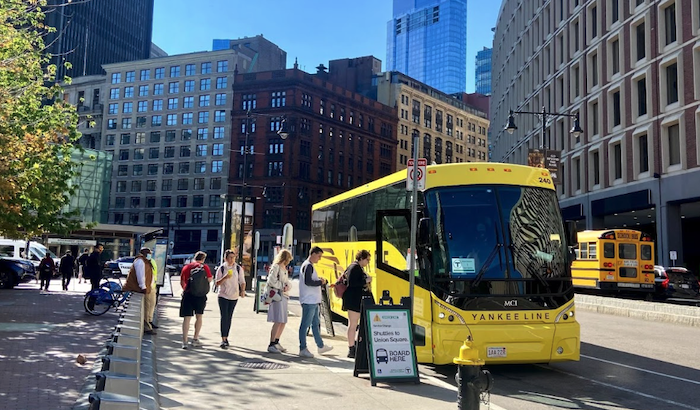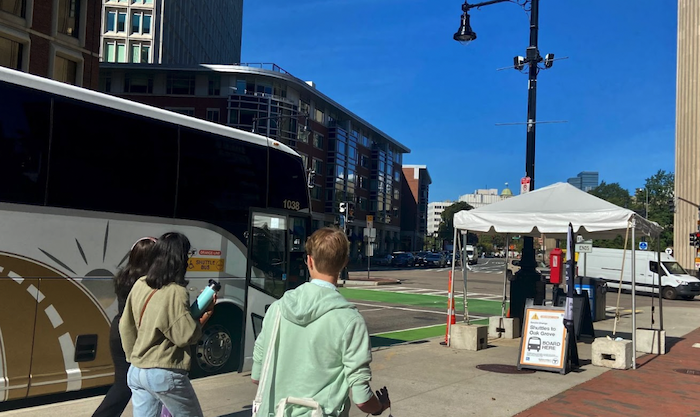
Remembering the inconvenience felt by many, boosting bike infrastructure, and putting the commuter rail to use for a change
Before the Orange Line reopened on time this morning after a month of track work, for 30 days, Malden resident Martha Argueta’s travel time more than doubled.
While overall impressions of the dreaded Orange Line shutdown have been surprisingly optimistic, Malden commuters like Argueta nevertheless experienced lateness as a result of heavy traffic, specifically during the rush hours on weekdays.
With the MBTA’s second-busiest line shut down, Malden Mayor Gary Christenson heard positive as well as negative feedback from residents.
“The biggest thing that I heard is that [people] were getting up earlier in order to allow for enough time to take the shuttle bus into Boston,” Christenson said. “But they’ve been really frequent in terms of picking up and dropping off here.”
Michael Pangilinan moved to Sullivan Square at the beginning of the Orange Line closure, and found it exhausting to ride three shuttle buses from South Roxbury up to the North End and back.
“I’ve been affected by it the whole time,” Pangilinan said.
Even though he works from home, Pangilinan said the traffic prevented him from going out and socializing.
“I’m not used to worrying about that because taking the T is the benefit—you don’t have to worry about traffic,” he said. “There isn’t really another convenient way to get here though, so I would just, if at all possible, come earlier or later or avoid it completely.”
Jarred Johnson, the executive director of TransitMatters, said the lack of advanced notice of the extensive construction program was another frustration he heard about during the shutdown.
“People were disappointed [with the] lack of time that they had to plan or the fact that people may have brought the passes for the month,” Johnson said. “And then they find out they only have a few days after they bought their pass, but for half of the month, they are not going to have access to the Orange Line.”
Meanwhile, there were new methods of travel put on the table. In addition to shuttle buses, some riders affected by T closures were able to take the commuter rail in certain zones for free by flashing their CharlieCard to conductors.
“It gave a lot of people a shorter trip than they would’ve had even with the orange line,” Johnson said.

Bluebikes were another popular alternative, with the service providing free 30-day passes for the duration of the shutdown. It wasn’t an option for Malden residents, Mayor Christenson said, though the city will gain three Bluebike stations in its downtown area in the first week of October.
“We wanted to situate the stations and the bikes near cities and towns,” the mayor said. The new stations will be at Malden Center, by the Northern Strand Community Trail, and Malden High School. “We are the last hub north of Boston, so a lot of the people that use buses will find their way into our stations.”
Bikes aren’t for everyone though. One visiting Canadian couple we spoke with noted that the region didn’t seem very cycle-friendly to them: “It was just so many roads coming in at different angles and lots of traffic and lots of horns.”
In Boston, Mayor Michelle Wu recently announced an initiative to address some of those concerns with a new plan to add 9.4 miles of bike lanes and 100 new Bluebike stations, along with raised crosswalks, speed bumps, and more staff to support the efforts.
Commuters will need all of the alternatives that they can get. The Orange Line may have reopened, but the MBTA recently announced that shuttles will replace the D branch of the Green Line from Sept. 24 to Oct. 30. Buses will also replace a portion of the Red Line during the first six days of October.
In the meantime, several “slow zones”—at Jackson Square, Back Bay, Tufts, and Haymarket— will persist for days.
All things considered, said Johnson of TransitMatters, future diversions are also likely. He’s especially concerned about a lack of funding for T operations and a lack of focus on improving conditions for maintenance workers, subway drivers, and bus operators.
“We have to make sure that we’re paying as much attention to these operating budgets and making sure that the T has the resources to make sure that they can do maintenance projects before we get to a crisis like this,” Johnson said. “We have to both take care of the maintenance and safety concerns and continue expanding access.”
Cici Yu is a junior studying journalism and public policy at Boston University. She is interested in city news, specifically about public policy, public health, and education.

